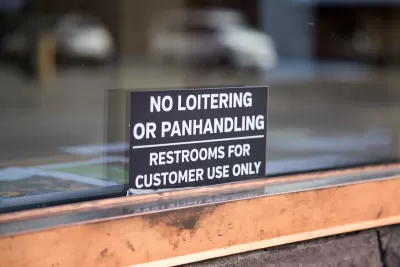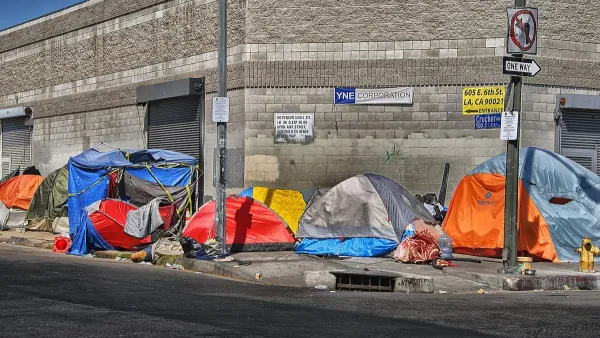Policies that punish and fine unhoused people for sheltering outdoors, even when other shelter is not available, are the most visible but least efficient ways to reduce homelessness.

In an opinion piece for Bloomberg Law, Will Knight argues that “using jailing sentences and criminal fines to address homelessness is ineffective and fundamentally unjust,” calling criminalization an “expensive and shortsighted” policy.
Knight makes the argument in anticipation of the U.S. Supreme Court’s imminent decision on Grants Pass v. Johnson, a case that will decide whether states and cities can criminalize unhoused people that stems in Grants Pass, Oregon, where the city issued $300 fines to people sleeping outside even though housing is practically unavailable and there is no emergency shelter.
“Although evidence shows criminalization to be the most expensive and least effective method, it remains the preferred policy. The hidden costs of this approach—policing, jailing, and clogging courts, not to mention the barriers it creates for individuals seeking housing due to fines or criminal records—are substantial.”
For Knight, “A Supreme Court ruling affirming that people shouldn’t be punished for trying to survive could encourage lawmakers to prioritize actual long-lasting solutions. These solutions should focus on ensuring housing is safe and affordable, rather than rely on punitive measures that don’t address the underlying issues.”
FULL STORY: The US Supreme Court Should End Criminalization of Homelessness

Maui's Vacation Rental Debate Turns Ugly
Verbal attacks, misinformation campaigns and fistfights plague a high-stakes debate to convert thousands of vacation rentals into long-term housing.

Planetizen Federal Action Tracker
A weekly monitor of how Trump’s orders and actions are impacting planners and planning in America.

San Francisco Suspends Traffic Calming Amidst Record Deaths
Citing “a challenging fiscal landscape,” the city will cease the program on the heels of 42 traffic deaths, including 24 pedestrians.

Defunct Pittsburgh Power Plant to Become Residential Tower
A decommissioned steam heat plant will be redeveloped into almost 100 affordable housing units.

Trump Prompts Restructuring of Transportation Research Board in “Unprecedented Overreach”
The TRB has eliminated more than half of its committees including those focused on climate, equity, and cities.

Amtrak Rolls Out New Orleans to Alabama “Mardi Gras” Train
The new service will operate morning and evening departures between Mobile and New Orleans.
Urban Design for Planners 1: Software Tools
This six-course series explores essential urban design concepts using open source software and equips planners with the tools they need to participate fully in the urban design process.
Planning for Universal Design
Learn the tools for implementing Universal Design in planning regulations.
Heyer Gruel & Associates PA
JM Goldson LLC
Custer County Colorado
City of Camden Redevelopment Agency
City of Astoria
Transportation Research & Education Center (TREC) at Portland State University
Jefferson Parish Government
Camden Redevelopment Agency
City of Claremont





























